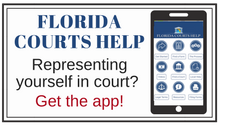Mediation staff may hold scheduled mediations remotely, VIA Telephone or Video Conference. Please email CAD-MediationRef@pbcgov.org or call 561-355-2739 to be connected to your mediator.
For Juvenile Dependency cases (DP cases), mediations are provided by Staff Mediators, without cost to the litigants.
Juvenile Dependency Mediation provides an opportunity to resolve issues that arise when a family has entered the Dependency system. Dependency Mediation provides an opportunity for the parents, other family members, foster parents, professionals involved in investigating and/or assisting the family, guardian ad litem, foster children advocates, any other parties and their respective lawyers in the case, to have an informal, confidential and privileged discussion moderated by a neutral and impartial mediator. The purpose of the Dependency Mediation is to see if the parties can voluntarily reach an agreement. If an agreement is reached, then it will be submitted to the court for its approval instead of each party pleading their case and asking the court to make the final decision in their case.
HOW to ZOOM: instructions for attorneys and litigants regarding remote hearings.
The Florida Rules of Juvenile Procedure, Rule 8.290 defines mediation as “a process whereby a neutral third person called a mediator acts to encourage and facilitate the resolution of a dispute between two or more Parties. It is an informal and non-adversarial process with the objective of helping the disputing parties reaches a mutually acceptable voluntary agreement. In mediation, decision –making authority rests with the Parties. The role of the mediator includes, but is not limited to, assisting the parties in identifying issues, fostering joint problem-solving, and exploring settlement alternatives.” Under that Rule, Dependency mediation means mediation of dependency matters.
Dependency Mediation
- Is a confidential and privileged, private, informal conversational process where the parties present their issues.
- Attorneys are frequently present, to advise their clients prior to making decisions.
- It is future oriented and the parties through negotiation, bargaining and compromise make decisions.
- The decision takes the form of an Agreement and or Case Plan, which tends to be mutually acceptable to all parties, and, as a result, there are no real losers in the process.
- It is a prompt process, which is relatively inexpensive, both emotionally and financially.
Dependency Mediator
- A dependency mediator is a Florida Supreme Court Certified Dependency Mediator.
- A dependency mediator facilitates the participants’ understanding of what mediation is and assess their capacity to mediate before the participants reach an agreement to mediate.
- A dependency mediator conducts the mediation process in an impartial manner.
- A dependency mediator structures the mediation process so that the participants make decisions based on sufficient information and knowledge.
- A dependency mediator maintains the confidentiality of all information acquired in the mediation process, unless the mediator otherwise permitted or required to reveal the information by law or agreement of the parties.
- A dependency mediator assists parties and participants in determining how to promote the best interests of children.
Who could be in attendance at the Dependency Mediation conference?
The mediator specially trained in Dependency Mediation, who facilitates the parties with a goal to reach an agreement in the best interest of the children:
All parties named in the Order of Referral to the Dependency Mediation Unit must attend the mediation conference.
These may include, but are not limited to the following:
- The parent or parents who are charged with allegations of abuse, neglect or abandonment, and attorney(s), if represented;
- The Department of Children and Families’ (DCF) caseworker and attorney;
- The children’s parent(s) not charged with abuse or neglect and attorney(s), if represented;
- A Guardian ad Litem (GAL) appointed by the Court to advocate for the best interest of the children. The Guardian ad Litem Program attorney may also be present; and,
- The children’s current custodian and the custodian’s attorney, if represented. A custodian could be a family member, foster care provider or other person approved by the Court. The following persons may also be present, with the agreement of all the parties: Relatives of the children, including the children’s grandparents or other family members; and Professionals and other individuals such as therapists, teachers, the clergy or other persons in support of the parents and/or the children, who can help the parties make informed decisions.
- Foster Children’s Project
What to Expect
The following issues may be discussed in order to reach an agreement in the best interest of the children:
- Case planning
- Referral to mental health and social services
- Parent/children disputes
- Issues relating to the placement of the child, either temporary, foster care, or adoption
- Visitation and support
- Termination of Parental Rights
If an agreement is reached at the end of the conference, the decisions made are produced in writing, reviewed, signed by the parties and submitted to the judge for approval. Once approved by the Judge, this becomes a binding Order of the Court and all of the parties must comply with the terms of the agreement. If mediation comes to an “impasse” in which no agreement is reached, the mediator reports this to the judge without further comment on the case. The case will proceed through the Juvenile Court System and at a later date the case will be decided by the Judge in a Final Hearing.
Florida Courts Help App
The app offers in one place information for people seeking a divorce, adoption, orders of protection, name change, and other family law issues. The Florida Courts Help app is available now from the most popular app stores. Links and instructions are also available at Help.flcourts.org.
Helpful Links
| Florida Rural Legal Services: | |
| Information and Tips for Attending Mediation in Florida | |
| Legal Aid of Palm Beach County | |
| Palm Beach County School Calendars |

